Fluxican 60 mg
Antidepressant medication Fluxican 60 is used to treat major depression, obsessive-compulsive disorder (OCD), bulimia nervosa (eating disorder), and panic disorder. Depression is a mental disorder characterized by feelings of sadness, unhappiness, anger, hopelessness, and/or loss that interfere with daily activities.
Fluoxetine is a selective serotonin reuptake inhibitor included in Fluxican 60. It prevents nerves from reabsorbing serotonin, a mood-boosting chemical messenger that communicates between brain cells. This increases serotonin levels in the neuron synapse, which aids in mood regulation and the treatment of depression.
Fluxican 60 may be consumed with or without food. Fluxican 60 should be administered precisely as prescribed. Depending on your medical condition and response to treatment, you should take Fluxican 60 for the prescribed duration. In certain instances, insomnia (difficulty sleeping), headache, diarrhea, nausea, fatigue, dry mouth, loss of appetite, and indigestion may occur. The majority of these side effects do not require medical intervention and will subside with time. However, if you have these side effects frequently, you should visit your physician.
Please do not stop taking Fluxican 60 on your own, as you may experience withdrawal symptoms. If you are pregnant or nursing, you should not take Fluxican 60 without your doctor’s approval. Fluxican 60 may cause dizziness and impair reaction time, so do not drive or operate heavy machinery while taking this medication. Fluxican 60 should not be administered to children younger than eight years old because its safety and efficacy have not been established. If you combine Fluxican 60 and alcohol, you may experience more dizziness. To rule out any adverse effects, keep your doctor informed about your current health status and medications.
Depression, obsessive-compulsive disorder (OCD), and bulimia nervosa have all been treated with Fluxican 60.
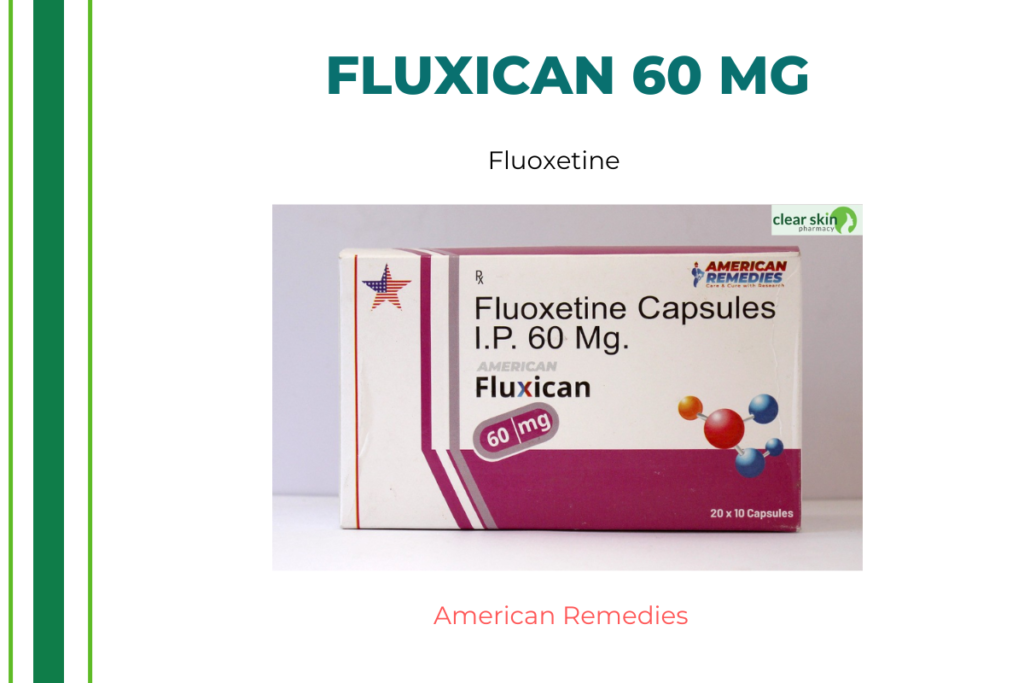
Medicinal Advantages
Fluxican 60 belongs to the selective serotonin reuptake inhibitors class of antidepressants. Major Fluxican 60 is used to treat depressive disorder, obsessive-compulsive disorder (OCD), bulimia nervosa (eating disorder), and panic disorder with or without agoraphobia. Fluxican 60 works by preventing the reabsorption of serotonin, a mood-enhancing chemical messenger that communicates between brain cells, by nerves. This increases serotonin levels in the neuron synapse, which aids in mood regulation and the treatment of depression. Fluxican 60 is also effective for the treatment of premenstrual dysphoria. (a severe manifestation of premenstrual syndrome) Fluxican 60 has fewer adverse effects than competing antidepressants. Fluxican 60 is a medication used to treat bipolar disorder and depression that is resistant to treatment.
Use Instructions
Fluxican 60 may be consumed with or without food. Your physician will determine how long you must take Fluxican 60 based on your medical condition and response to treatment. Take Fluxican 60 exactly as prescribed by your physician. Fluxican 60 should be swallowed whole with a full glass of water; the pill should not be chewed or crushed. Fluxican 60 is a liquid that should be administered orally using the included measuring cup. Before each usage, thoroughly shake the pack.
Storage
Place in a cool, dry area out of direct sunlight.
Fluxican 60 Side Effects
I’m having trouble sleeping
Headache
Diarrhea
Nausea
Fatigue
The mouth is dry.
Appetite reduction
Indigestion
Drug Recommendations
Do not take Fluxican 60 if you are allergic to any of its ingredients, are taking or have recently taken monoamine oxidase inhibitors (MOA), or are taking metoprolol. If you combine Fluxican 60 with opioid antagonists such as buprenorphine or naloxone, you run the risk of developing serotonin syndrome, a potentially fatal condition. Consult your physician immediately if you have suicidal thoughts, such as murdering or harming oneself. Inform your doctor if you have or have had epilepsy, mania, glaucoma, diabetes, bleeding issues, or hyponatremia (low sodium levels). If you are pregnant or nursing, you should not take Fluxican 60 without your doctor’s approval. Fluxican 60 may cause dizziness and reduce reaction time, therefore do not drive or operate heavy machinery while taking this medication. Fluxican 60 should not be administered to children younger than eight years old because its safety and efficacy have not been established. If you combine Fluxican 60 and alcohol, you may experience more dizziness.
Interactions Between Drugs
Fluoxetine may interact with antihypertensive (metoprolol, nebivolol), opioid antagonist (buprenorphine, naloxone), antibiotic (linezolid), antipsychotic (pimozide, thioridazine, lithium, risperidone), antidepressant (methylene blue/methylthioninium chloride, bupropion), and antipsychotic medications (pimozide,
Fluoxetine and St. John’s wort should not be taken at the same time. Alcohol should not be consumed while taking Fluoxetine, as it may intensify its sedative effects.
Fluoxetine may interact with glaucoma, diabetes, epilepsy, mania, bleeding, hyponatremia (low sodium levels), heart, liver, and kidney failure.
Cautionary Note
ALCOHOL
Avoid consuming alcohol while taking Fluoxetine, as it may create dizziness.
PREGNANCY
Fluoxetine is a pregnancy category C medication. Consult your physician before taking Fluoxetine if you are pregnant; your physician will only prescribe if the benefits exceed the risks.
BREAST FEEDING
There is fluoxetine in breast milk. Consult your physician before using Fluoxetine; your physician will assess whether or not it is safe to use Fluoxetine while breastfeeding.
DRIVING
Fluoxetine may induce dizziness and impair reaction time. If you have these symptoms, you should not drive or operate heavy machinery.
LIVER
In patients with liver illness, dose modifications may be required. If you have any concerns about this or if you have a liver condition, please consult a physician.
KIDNEY
In patients with renal illness, it may be required to alter the dosage. Please consult your doctor if you have any concerns about this or if you have renal impairment.
No habit formation
Advice on Diet and Lifestyle
Maintaining a nutritious diet and engaging in regular physical activity can aid in enhancing both general health and self-esteem.
Frequent counseling sessions are required.
Engage in yoga and meditation. This aids in relieving stress and calming the body.
To improve the quantity and quality of your sleep, maintain a consistent sleep schedule.
Omega fatty acids can be found in abundance in fish, nuts, fresh fruits and vegetables, and olive oil.
Neurotransmitter building blocks are amino acids. Meat, dairy products, and certain fruits and vegetables are rich in amino acids, which are necessary for the proper maintenance of neurotransmitters.
Complex carbohydrates activate serotonin. They include whole grains, legumes, spinach, broccoli, oranges, and pears.
Exercise stimulates the body’s production of natural antidepressants. Additionally, it aids in stress reduction, mood improvement, self-esteem enhancement, and restful sleep.
Avoid tobacco use and alcohol consumption.
Learn about your disease, identify its risk factors, and adhere to your doctor’s treatment plan.
Additional Information : This item is non-refundable.
Glossary of Diseases and Conditions
Major depressive disorder, also known as clinical depression, is a mental health condition characterized by a prolonged and persistent state of extreme melancholy. Affects mood, behavior, and other bodily systems such as sleep and hunger. Symptoms include sadness, loss of interest, changes in eating habits, sleep disturbances, restlessness, fatigue, feelings of worthlessness or guilt, suicidal ideation, difficulty concentrating, making decisions, and thinking. The precise cause of depression is uncertain. However, stress, hormonal changes, alcohol or drug abuse, maltreatment during childhood, certain medical conditions, and medications may all increase the likelihood of developing depression.
Obsessive-Compulsive Disorder (OCD) is a mental disorder characterized by obsessive thoughts (obsessions) and the need to perform actions repeatedly.
Bulimia nervosa is a serious eating disorder characterized by binge eating followed by weight loss strategies including vomiting, extreme exercise, and fasting.
Panic disorder is an anxiety disorder characterized by panic attacks. When a person is in this position, he or she experiences fear even in the absence of danger. Symptoms include a rapid heartbeat, difficulty breathing, chest or stomach discomfort, weakness or vertigo, and profuse sweating.
FAQs
Fluoxetine inhibits the reabsorption of serotonin, a mood-enhancing chemical messenger that interacts between brain cells, by nerves. This increases serotonin levels in the neuron synapse, which aids in mood regulation and the treatment of depression.
Due to its ability to suppress appetite, fluoxetine may result in weight loss. Maintain a healthy weight through a balanced diet and regular exercise. If you have weight fluctuations while taking Fluoxetine, consult your doctor immediately.
Fluoxetine should not be discontinued without consulting a physician, as withdrawal symptoms may occur. Continue taking Fluoxetine for as long as prescribed to treat your condition adequately. If you experience any problems while taking Fluoxetine, do not hesitate to inform your doctor; the dosage may be gradually decreased.
Fluoxetine has been associated with decreased sexual desire, erectile dysfunction, and orgasm. If you have any concerns, consult your physician.
Fluoxetine may result in dry mouth as a side effect. Caffeine restriction, avoiding tobacco and mouthwashes containing alcohol, consuming copious amounts of water, and chewing sugar-free gum/candy may all boost saliva production and prevent mouth dryness.
If you have glaucoma, see your physician before using Fluoxetine, as it may increase eye pressure.
Consult your physician before using Fluoxetine if you have diabetes, as it may affect blood glucose levels. If you are using Fluoxetine, you should regularly monitor your blood sugar levels. If your blood sugar levels fluctuate, consult your physician.
Fluoxetine has been associated with an increase in bone fractures. Consult a physician before using Fluoxetine if you have osteoporosis. Consult a physician if you are suffering bone discomfort.


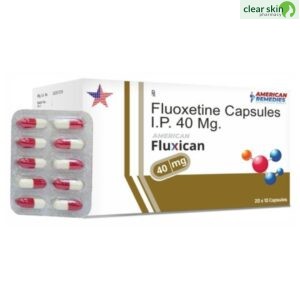
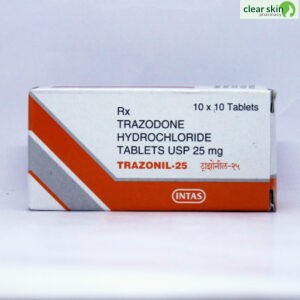

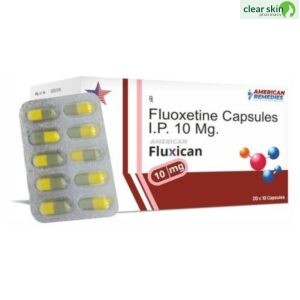
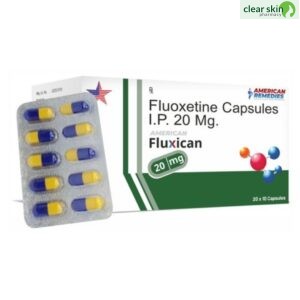
Be the first to review “FLUXICAN 60MG 10 tablets”